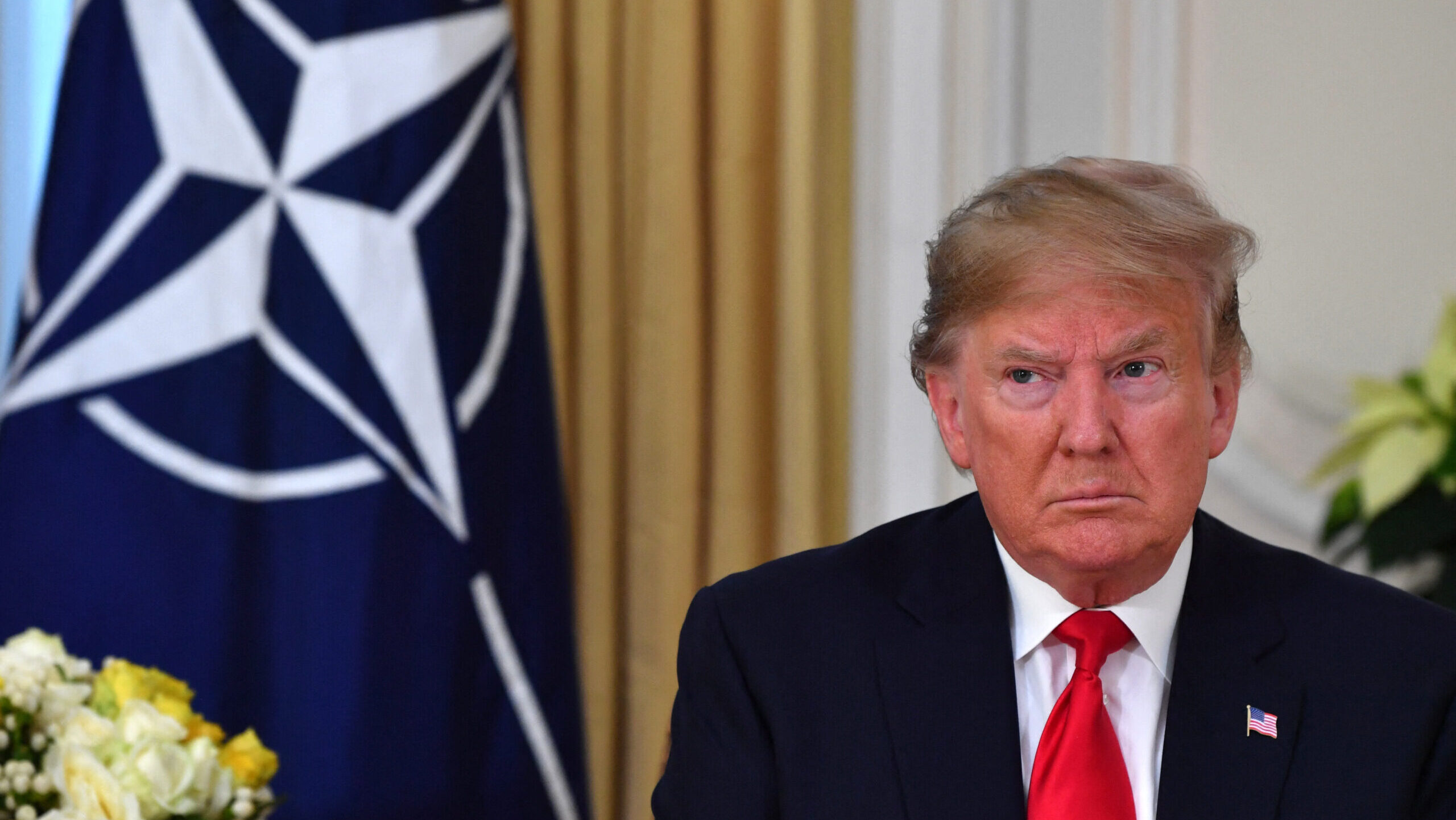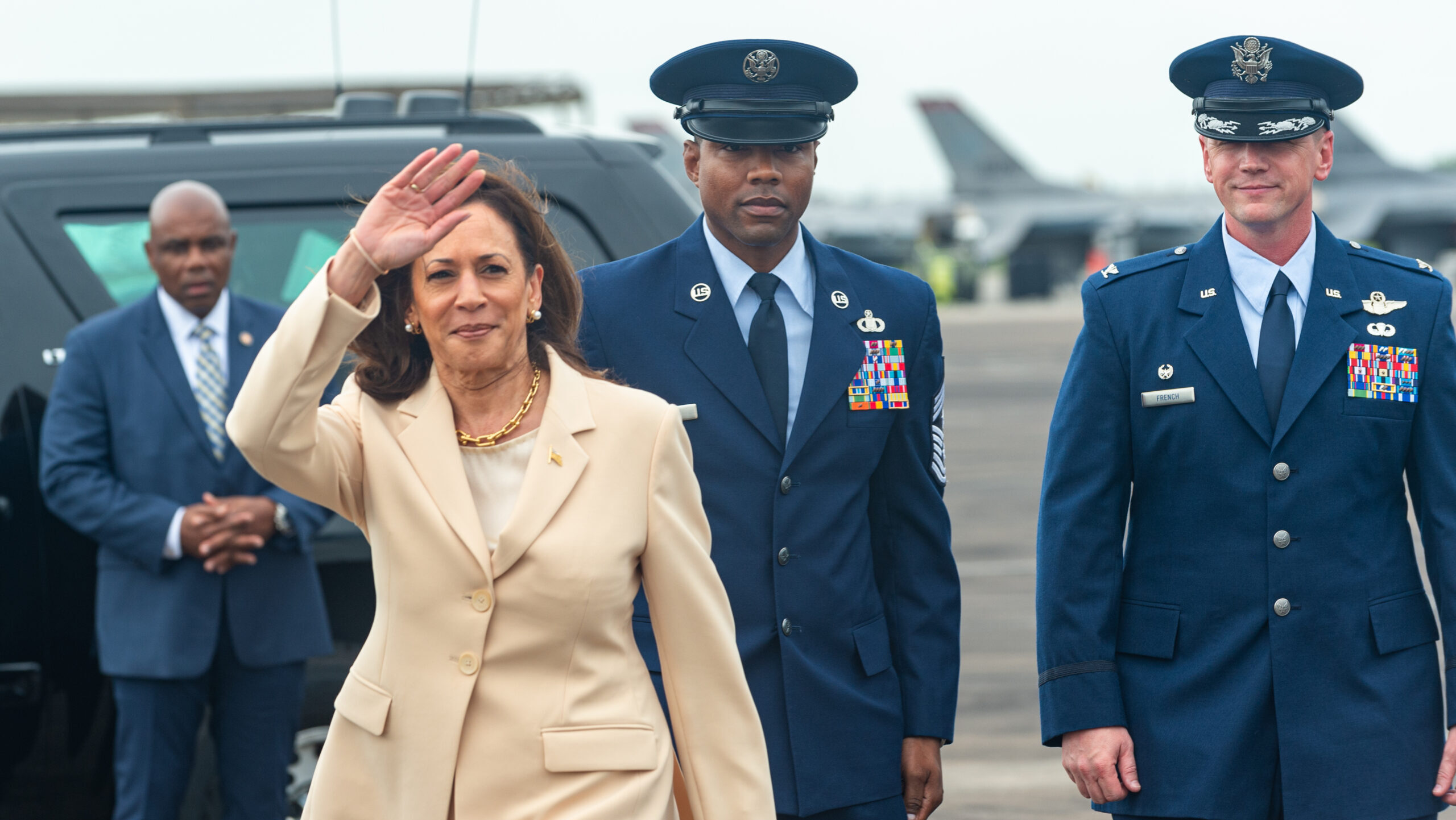US
Vice
President
and
Democratic
presidential
candidate
Kamala
Harris
(R)
shakes
hands
with
former
US
President
and
Republican
presidential
candidate
Donald
Trump
during
a
presidential
debate
at
the
National
Constitution
Center
in
Philadelphia,
Pennsylvania,
on
September
10,
2024.
(Photo
by
SAUL
LOEB/AFP
via
Getty
Images)
WASHINGTON
—
On
Tuesday,
Americans
will
head
to
the
polls
to
cast
a
vote
for
either
Vice
President
Kamala
Harris
or
former
President
Donald
Trump
in
an
election
where
national
security
has
taken
a
backseat
to
domestic
issues
like
the
economy,
immigration
and
abortion
rights.
Neither
Harris
nor
Trump
have
provided
details
on
their
defense
priorities
and
the
budget
it
will
take
to
bring
them
to
fruition.
But
both
have
spent
four
years
in
the
White
House,
leaving
plenty
of
clues
as
to
how
they
could
lead
the
most
powerful
military
in
the
world.
And
while
analysts
told
Breaking
Defense
a
Trump
administration
would
likely
be
a
more
unpredictable
one
on
defense
policy
compared
to
a
relative
continuation
of
Biden
administration
priorities
under
Harris,
they
also
said
that
equally,
if
not
more
important,
will
be
whichever
party
controls
the
houses
of
Congress
where
the
defense
budget
is
crafted.
“We
have
a
much
wider
range
of
uncertainty
when
it
comes
to
Trump,”
said
Todd
Harrison,
a
defense
budget
expert
with
the
American
Enterprise
Institute.
“Under
Trump,
we
could
see
a
huge
shift
in
strategy
to
become
much
more
isolationist,
which
could
end
up
bringing
major
changes
in
the
defense
budget
and
a
drastic
reduction
in
force
structure.”
At
the
same
time,
Harrison
added,
“the
makeup
of
Congress,
and
specifically
the
makeup
of
the
House,
I
think
will
actually
matter
much
more
to
the
future
of
the
defense
budget
than
whoever
the
president
is.”
Meanwhile,
public
comments
by
industry
executives
suggest
they’re
confident
the
demand
signal
for
their
products
will
remain
strong,
no
matter
what
happens
next
week.
With
four
days
until
America
votes
on
its
next
leader,
here
are
the
key
factors
at
play.
For
Trump,
Uncertainties
And
International
Skepticism
The
Republican
platform
includes
a
promise
to
“prevent
World
War
Three,
restore
peace
in
Europe
and
in
the
Middle
East,
and
build
a
great
Iron
Dome
missile
defense
shield
over
our
entire
country.”
Throughout
the
campaign
trail,
Trump
has
reiterated
those
statements,
potentially
setting
the
stage
for
greater
missile
defense
investments.
At
the
same
time,
he
has
questioned
whether
the
US
should
remain
in
NATO,
a
longtime
point
of
skepticism
for
the
former
president,
who
has
hammered
alliance
members
for
failing
to
live
up
to
the
2
percent
GDP
commitment
for
defense
spending.
Trump
has
also
signaled
that
he
would
oppose
further
military
aid
for
Ukraine
unless
it
enters
peace
talks,
and
stated
in
September
that
Ukraine
should
have
made
“concessions”
to
Russia
to
avoid
war,
according
to
the
Associated
Press.
RELATED:
Zelensky
implores
US
to
continue
aid
for
Ukraine
amid
election
uncertainty
During
a
rally
at
Madison
Square
Gardens
on
Sunday,
Trump
said
he
would
strengthen
and
modernize
the
military,
reiterating
an
old
2020
claim
that
he
had
“rebuilt
our
military
in
total.”
But
Harrison
said
those
comments
are
somewhat
contradictory,
leaving
it
unclear
how
much
defense
funding
Trump
believes
is
actually
needed.
“If
you’ve
got
all
new
equipment,
why
do
you
need
to
procure
anything
else?”
Harrison
said.
“Of
course,
it’s
laughably
untrue
what
he
said.
But
what
if
he
actually
believes
it?”

US
President
Donald
Trump
speaks
during
his
meeting
with
Nato
Secretary
General
Jens
Stoltenberg
at
Winfield
House,
London
on
December
3,
2019.
(Photo
by
NICHOLAS
KAMM/AFP
via
Getty
Images)
While
Trump’s
first
term
brought
rising
budgets
and
a
renewed
focus
on
China
to
the
Pentagon,
Trump
himself
was
sometimes
a
turbulent
influence
on
the
department,
with
moments
that
included
personally
involving
himself
in
contract
negotiations
for
the
F-35
and
Air
Force
One,
and
unilaterally
promising
to
cut
the
defense
budget,
only
to
reverse
course
and
boost
the
budget
after
meeting
with
key
defense
leaders.
That
volatility
makes
it
hard
to
know
whether
Trump
is
serious
when
he
talks
about
leaving
NATO
or
signaling
that
he
could
revoke
support
for
Ukraine,
analysts
said.
“Maybe
none
of
this
happens.
That
is
one
view
that,
‘Oh,
this
is
just
rhetoric,’”
said
Byron
Callan
of
Capital
Alpha
Partners.
“But
I
think
that
there
would
be
a
pretty
profound
period
of
uncertainty
until
those
answers
are
known.”
Roman
Schweizer,
a
defense
analyst
with
TD
Cowen,
was
optimistic
about
defense
investments
under
a
Trump
presidency,
characterizing
the
Republican
platform
as
“very
supportive
of
defense.”
He
added
that
prominent
national
security
Republicans
in
Congress
and
within
the
administration
would
likely
be
supportive
of
increasing
the
base
budget,
though
they
may
be
less
likely
to
approve
supplemental
spending
like
the
foreign
aid
bill
passed
last
spring,
which
approved
additional
funds
for
Ukraine,
Israel,
Taiwan
and
key
US
defense
industrial
base
priorities.
However,
even
if
the
Trump
administration
is
broadly
supportive
of
defense
spending,
other
campaign
priorities
could
have
negative
impacts
on
the
defense
industry,
Callan
said.
For
instance,
plans
to
enact
a
20
percent
tariff
on
all
imported
goods
could
result
in
financial
pressure
on
defense
contracts.
Another
complication
could
be
the
potential
creation
of
a
new
organization,
the
Department
of
Government
Efficiency,
centered
on
reducing
federal
spending,
Callan
said.
Trump
has
said
he
would
tap
SpaceX
founder
Elon
Musk
to
lead
the
new
department,
and
Musk
said
on
Sunday
he
believed
he
could
cut
at
least
$2
trillion
from
the
$7.3
trillion
federal
budget
requested
for
FY25.
“When
you
start
hearing
those
numbers
get
thrown
around,
it’s
like,
if
you
think
defense
is
going
to
be
rising
with
a
$2
trillion
cut,
it’s
not
going
to
happen,”
Callan
said.
“Not
that
I
think
a
$2
trillion
cut
is
likely,
but
just
this
period
of
uncertainty
about,
well,
what’s
going
to
happen?”
For
Harris,
A
Potential
Biden
2.0
Pentagon
Analysts
agreed
that
a
Harris
victory
would
likely
bring
a
fair
amount
of
continuity
with
the
Biden
administration
in
terms
of
both
policy
and
personnel,
should
the
new
administration
retain
some
Pentagon
leaders
like
Air
Force
Secretary
Frank
Kendall,
who
has
expressed
interest
in
serving
under
Harris.
During
her
speech
at
the
Democratic
National
Convention,
Harris
said
she
would
ensure
the
United
States
retains
“the
strongest,
most
lethal
fighting
force
in
the
world,”
and
that
the
nation
wins
the
technological
race
against
China
in
areas
like
space
and
artificial
intelligence.
Unlike
Trump,
she
has
vowed
to
“stand
strong
with
Ukraine
and
our
NATO
allies,”
signaling
she
would
seek
further
military
aid
for
Ukraine
going
forward.
And
while
Harris
condemned
the
humanitarian
crisis
in
Gaza,
she
said
she
would
“always
ensure
Israel
has
the
ability
to
defend
itself,”
confirming
that
she
will
also
continue
military
aid
for
Israel.
Still,
that
doesn’t
mean
a
Harris
presidency
would
mean
a
gold
rush
for
defense
contractors,
Harrison
said.
His
prevailing
assumption
is
that
a
Harris
administration
would
prioritize
domestic
spending,
leading
to
defense
budgets
that
are
“basically
flat
with
inflation
or
maybe
slight
real
growth.”
“The
only
way
I
would
see
significant
defense
budget
growth
in
the
Harris
administration
is
if
it
is
part
of
a
deal
with
congressional
Republicans
to
get
through
some
of
her
priorities
on
the
non-defense
side
of
the
budget,”
he
said.

Vice
President
Kamala
Harris
waves
after
arriving
at
Ellington
Field
JRB
and
being
greeted
by
Chief
Master
Sergeant
Bennie
Bellvin,
147th
Attack
Wing
Command
Chief
and
Colonel
Bif
French,
147th
Attack
Wing
Commander,
July
24,
2024.
(U.S.
Air
National
Guard
photo
by
Tech.
Sgt.
Stacy
Cooper)
Schweizer
said
the
single
best
scenario
for
defense
contractors
is
a
Harris
win,
coupled
with
a
Democratic
House
and
Republican
Senate.
That
permutation
of
what
he
called
the
“congressional
Rubik’s
cube”
couples
Harris’s
likely
support
for
Ukraine
and
Israel
with
a
pro-defense
Senate
and
—
most
importantly
—
a
House
where
the
far-right
Freedom
Caucus
would
have
little
power
to
stymie
military
aid
for
supplemental
spending,
he
said.
The
worst-case
scenario,
according
to
Harrison,
is
a
narrow
Republican
majority
in
the
House,
“because
the
Freedom
Caucus
will
continue
to
hold
defense
hostage
to
try
to
give
more
spending
cuts
overall,”
he
said.
‘Trading
On
Results’
Although
defense
companies
announced
third
quarter
results
in
late
October,
just
a
couple
weeks
before
Election
Day,
the
subject
of
the
next
president
largely
flew
under
the
radar
during
earnings
calls
with
investors.
“Right
now,
the
stocks
are
really
trading
on
results,”
Callan
said.
“They
don’t
appear
to
be
looking
beyond
results
and
into
election
scenarios.”
Even
when
pressed,
executives
haven’t
drawn
a
distinction
between
how
a
Harris
or
Trump
presidency
could
impact
defense
spending
—
at
least
not
publicly.
Northrop
Grumman
CEO
Kathy
Warden
said
she
didn’t
expect
a
“significant
difference”
in
defense
spending
between
a
Trump
or
Harris
administration
during
an
earnings
call
last
month.
“What
we
have
seen
over
time
is
that
the
defense
budget
more
reflects
the
threat
environment
than
any
particular
administration
change,
and
so
we
fully
expect
that
again,
this
time,”
she
said. “The
national
defense
strategy
has
remained
consistent
over
the
past
several
years,
in
the
last
couple
of
administrations,
and
we
believe
that’s
because
it
is
responsive
to
the
emerging
threats
around
the
globe
and
focused
on
both
deterring
and
defending.
And
in
that
regard,
it’s
well
aligned
to
the
program
portfolio
that
Northrop
Grumman
has.”
Similar
sentiments
have
been
shared
by
Frank
St.
John,
Lockheed
Martin’s
chief
operating
officer.
During
an
August
interview
with
Breaking
Defense,
St.
John
said
that
the
Pentagon
is
experiencing
“a
flat
or
a
declining
real
purchasing
power”
relative
to
inflation,
but
added
that
it
was
too
early
to
say
how
defense
budget
toplines
could
shape
up
over
the
next
couple
years.
“With
regards
to
the
election,
we
think
that
deterrence
and
deterrence
capabilities
are
an
enduring
theme,
regardless
of
which
party
is
in
the
executive
branch
or
who’s
in
control
of
Congress,”
he
said.
“And
so
we
think
our
programs
are
well
supported
in
the
budget,
and
we’re
looking
forward
to
working
with
whatever
the
new
administration
looks
like.”
Other
defense
executives
pointed
to
the
uncertain
political
environment
as
a
factor
underlying
more
conservative
projections
about
how
business
could
fare
in
2025
and
beyond.
Speaking
to
investors
during
an
Oct.
19
earnings
call,
Leidos
Chief
Financial
Officer
Chris
Cage
said
the
company
sees
“growth
momentum”
in
its
defense
unit
but
wants
to
be
“cautious”
about
giving
more
exact
financial
guidance
for
2025
until
there
is
greater
certainty
on
the
outcome
of
the
election
and
ongoing
FY25
budget
process.
“You
look
at
the
backdrop,
we’re
clearly
in
an
election
year.
There
is
a
risk
of
…
an
extended
CR
and
some
disruption,”
he
said.
“If
we
get
more
clarity
in
the
several
months
ahead,
we’ll
be
in
a
better
position
to
refine
that
point
of
view
going
into
the
early
part
of
next
year.”

